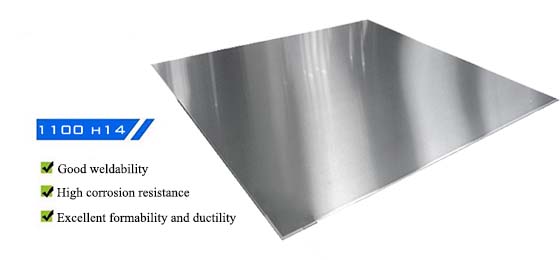- Email: sales@flait-aluminum.com
- Tel: 0086-13203837398

Aluminum 1100 belongs to the 1 series of pure aluminum alloys, containing 99% aluminum. H14 is a semi-hard state, which means that the alloy has been strain-hardened to a strength approximately between annealed (O) and fully hard (H18) . Common trade names include UNS A91100, ISO Al99.0Cu, AA1100-H14, and Al1100-H14.
Aluminum 1100 H14 is a cost-effective aluminum alloy with a wide range of applications. It is usually supplied in the form of sheets or coils , such as 1100 H14 aluminum plates and 1100 H14 aluminum coils.
 Excellent formability and ductility
Excellent formability and ductility1100 aluminum plate belongs to the pure aluminum plate series and has excellent ductility and formability. H14 is semi-hard, which gives it a certain strength and good forming and processing properties.
 High corrosion resistance
High corrosion resistance1100 aluminum plate has high corrosion resistance, and its corrosion resistance can be further improved after anodizing. The surface is smooth without obvious flaws and has good aesthetics.
 Good weldability
Good weldability1100 aluminum plate has good weldability and can be welded by gas welding, arc welding, spot welding and other welding methods.
 Not heat treatable
Not heat treatable1100 aluminum plate cannot be heat treated and strengthened, and its strength is relatively low. It is not used in applications requiring high strength or hardness.
| Physical properties | Density | 2.7 g/cm3 |
| Mechanical Properties | Tensile Strength (MPa) | 130 |
| Yield Strength (MPa) | 110 | |
| Fatigue Strength(MPa) | 49 | |
| Elongation (%) | 8.2 | |
| Brinell Hardness | 32 | |
| Electrical Properties | Electrical Conductivity: Equal Volume | 59 % IACS |
1100 H14 aluminum is widely used in components that require good formability and high corrosion resistance but do not require high strength, such as sheet metal products, radiators, nameplates, printing boards, cookware, building materials, heat exchanger components, etc. If excellent ductility and corrosion resistance are your primary goals, 1100 H14 aluminum is an excellent choice.